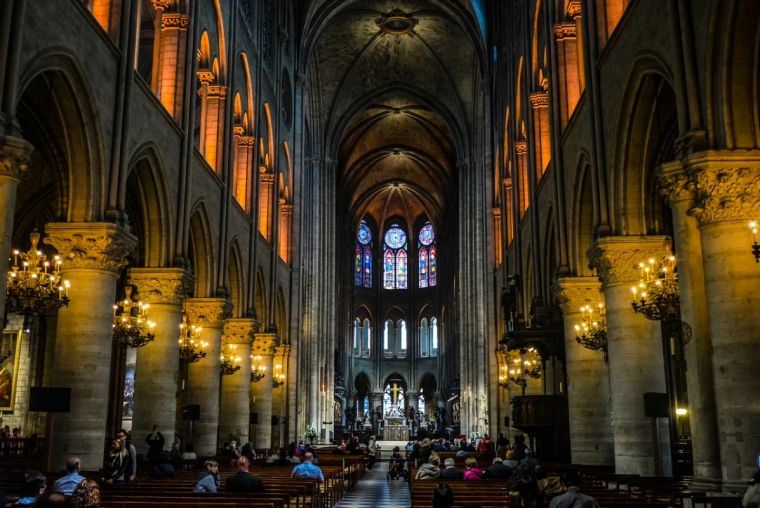#ThingsDisabledPeopleKnow: Churches aren't good with disability
I've not seen the film The Upside. I don't even know what it's about. But I do know there are complaints that a disabled character is once again being played by an able bodied person. It's what those in the world of disability call 'cripping up'.
A comment in response to this started an avalanche of responses on twitter this weekend, and #ThingsDisabledPeopleKnow started trending very quickly. On Friday night it had received over 19,000 responses
It's sobering reading. As a wheelchair user I could identify with many tweets, even laugh at some – such as people walking in front of my moving power-chair because they are looking at their phones and then blaming my driving skills.
The responses were about many types of disability, and covered instances of unfairness, judgements, unsolicited advice and poor access. I can recommend reading the stream of tweets.

I'm sad to say that the church came out pretty badly in this. I had no idea that churches and Christian schools in America campaigned to be exempt from disability access law – and succeeded.
This is appalling and sends an awful message.
Tweets included ones like the old chestnut, 'No, praying for me won't make a difference.' There was also the standard comment of disabled people not seen as being fit to minister and just not being welcomed as a valuable member of the church.
Yes, a higher proportion of these tweets were from America, but it is just the same in the UK.
As a disabled person, I hear the stories and experience the issues. It is especially hard for families who have children with additional needs. As a disabled person in ministry I am acutely aware of the issues there too.
Bearing in mind that wheelchair use is on the lower end of the vast array of disabilities, I'm going to share my experience of church on Christmas eve – not as a gripe but a helpful hint of how being disabled in a church sometimes feels.
Because my own church doesn't do a midnight service, we opted to go to another local church.
I can walk a little bit, and where I'm not sure of access because a church hasn't said anything about it on their website, I will opt to walk slowly, so this is what I did. The church entrance was wheelchair accessible, and there were even large print service sheets. As I tottered in, I could see that if I had come in my chair, I would have been put where I couldn't see anything – and not be able to go up for communion due to a step going up to the altar. So I sat in a pew where I could see when everyone else was standing – without the indignity of having someone else's bottom shoved in my face .
This was a church that expected you to stand and turn to face any processions. I was the only one who didn't stand or turn. I was the recipient of a few dagger-looks and some 'Oh dear, she doesn't know what to do' looks, closely followed by the 'Oh bless, she can't stand up' look when they spotted the crutch – usually accompanied by the head tilt of compassion.
Due to the pews, by the time we were sent row by row to receive communion, I was in too much pain to make the long walk up to the front and negotiate the step. The usher said that they could bring the sacraments to me after everyone else had finished. This would mean stopping the flow of the service and everyone watching the minister walking the length of the church to give me the bread and wine. Being an introvert I declined, fearing what a colleague of mine calls 'the meerkat phenomenon' when all heads turn simultaneously in your direction, in my case because I was holding up proceedings.
That's a very potted version of my experience – there was more.
Some would say that the problem was my pride. No, it wasn't. I think most people would struggle with what I describe here.
Some would say that the church had done their duty in providing 'reasonable adjustments' and I should be thankful. Yes, they had and yes I was. But it hadn't taken into account the feeling of humiliation.
So, what would I say to this church under the #ThingsDisabledPeopleKnow hashtag?
Churches should put clear access information on their websites so disabled people can make an informed choice.
I might also say that wheelchair users need a place to park that is within the congregation, not apart from it. And a ramp to the altar tells me that I'm welcome, rather than God doesn't want me messing up the Church.
Doing this all over again, knowing the layout, I would have chosen to use my wheelchair and park in that place where I can't see or be seen. This would have meant no meerkat phenomenon when I couldn't do what the service expected me to do.
Or maybe I would have looked for a different church more suitable to my needs – something many people with disabilities and additional needs are asked to do on a regular basis by the church they attend.
And now for a tweet that will really put the cat among the pigeons, especially when in my experience most churches and organisations are taken up with discussing every other diversity out there other than disability. When I hear people list the various characteristics of diversity represented in their policies, more often than not, disability is missing. So:
#ThingsDisabledPeopleKnow: When people talk about diversity they generally aren't thinking about disability.
Maybe that's a subject for another day. #IfIHaveTheCourage
Kay Morgan-Gurr is chair of Children Matter and co-founder of the Additional Needs Alliance. Follow her on Twitter @KayMorgan_Gurr











